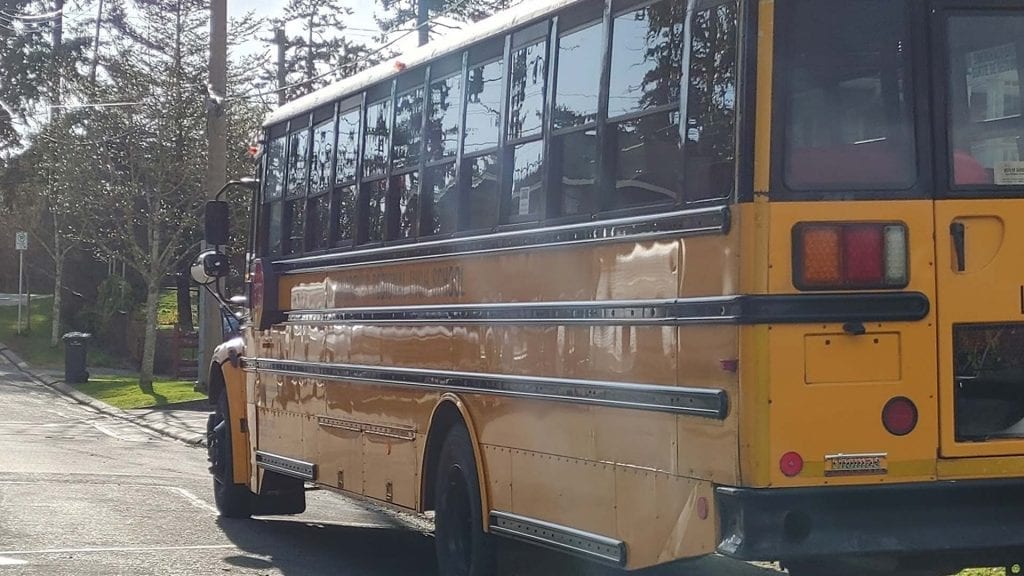
Transportation to and from school is one way that the government helps to support First Nation student success. Photo: Katłįà (Catherine) Lafferty/IndigiNews
Historically, Indigenous Peoples have been mistreated in Canada’s education system, in residential and day schools — experiences that are well-documented in the Truth and Reconciliation Commission (TRC)’s final report.
It is the government’s fiduciary duty to take measures to repair this broken relationship.
In the TRC’s 94 calls to action, calls 6-12 have to do with education. It calls on the government to remove barriers to Indigenous students’ academic success. Through changes to curriculum, cultural supports, nutrition, tuition and transportation, here are five things that federal and provincial governments are doing to respond to these calls.
Curriculum
The B.C. government created an Indigenous Education Resource Inventory to help incorporate Indigenous knowledge and perspectives into classrooms, in partnership with the B.C. Teachers Federation, Métis Nation British Columbia and the First Nations Education Steering Committee (FNESC). FNESC is also working to develop Indigenous-led curriculum, including the creation of an Authentic First Peoples Resource Guide.
Cultural Supports
In the 2019-20 school year, the B.C. government collaborated with Indigenous communities to create a formal process to incorporate community input into how educational services are delivered, writes a spokesperson for the Ministry of Education in an email to Indiginews.
According to the ministry, funding to support Indigenous students in the Greater Victoria School District 61 serving Esquimalt, Oak Bay, Victoria, View Royal and a portion of Saanich and Highlands, has increased from $1.7 million in 2016-17 to an estimated $2.3 million for 2021-22.
Nutrition
The B.C. Ministry of Education funds a CommunityLINK (Learning Includes Nutrition and Knowledge) program which provides over $53 million province-wide annually for 60 school districts to support “vulnerable students” with services that include meal programs for Indigenous and non-Indigenous students.
Tuition
While it’s commonly believed that all First Nations people have access to free post-secondary education in Canada, this isn’t true. However, there are many programs that the federal government has set in place to assist First Nations, such as the University and College Entrance Preparation Program (UCEPP), the Post-Secondary Student Support Program administered through Indigenous Services Canada, First Nations and Inuit Youth Employment Strategy, and bursaries that can be found by using the Indigenous Bursaries Search Tool.
In B.C., youth aged 19-26 who have been through the child welfare system may be eligible for free tuition, under the Provincial Tuition Waiver Program.
Transportation
A 2018 BC Tripartite Agreement (BCTEA) between the federal and provincial governments, and signatory First Nations, supports and benefits both on-reserve and off-reserve students, including transportation services.
“As part of the tripartite agreement, there is a $3.8 million federally-funded First Nation Student Transportation Fund for First Nations Students who attend B.C. public schools, which began in the 2019/20 school year,” writes a spokesperson for B.C.’s Ministry of Education in an email to IndigiNews.
“This fund is used to reduce or eliminate rider fees, while also ensuring service improvements and cutting down the time students spend getting to and from school.”
The federal government has also provided $1.7 million in one-time funding for buses for First Nations schools with a commitment to providing $1 million for buses annually. It has also boosted the annual budget for transportation costs for on-reserve students attending public schools by $1.3 million, according to the B.C. government.
There is still much work to be done to support Indigenous students in B.C.
“The Indian Act makes no provision for supporting culturally and linguistically relevant education or ‘quality’ education and makes no guarantees for adequate and sustainable funding,” according to a fact sheet by the Chiefs Assembly on Education from 2012.
But there are ongoing efforts to restructure the educational system and First Nation across B.C. continue to advocate for better services for students. For example Local Education Agreements aim to “promote and achieve effective working relationships between First Nations and local boards of education,” according to the First Nations Education Steering Committee
It’s important that there are safe, positive, respectful learning spaces within the education system, so that Indigenous students and families can have a say in the future of their education. It’s hopeful that the government seems to be committed to co-creating an action plan and looking for ways to increase shared decision-making.











